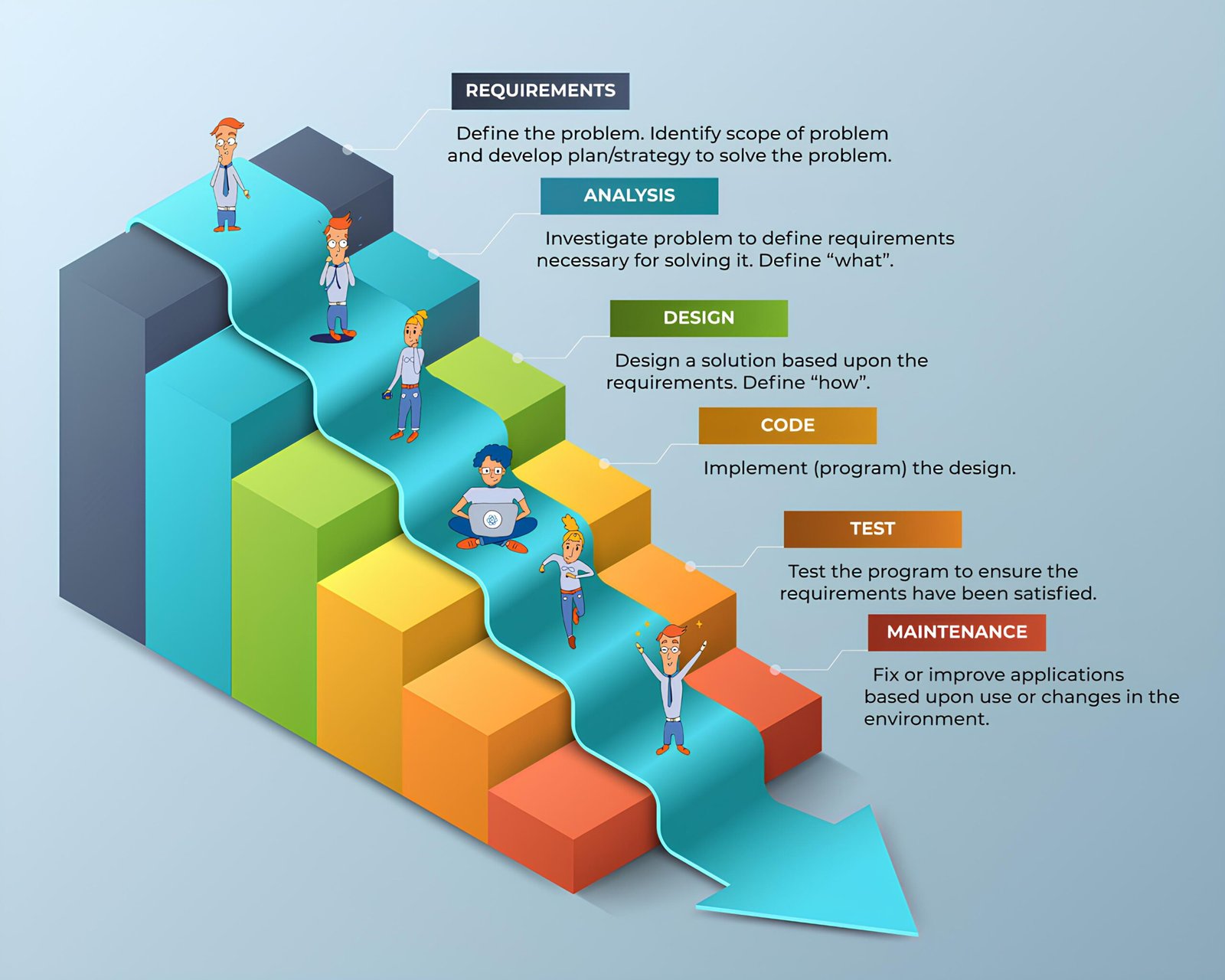Top Artificial Intelligence Courses to Boost Your Career in 2024
Maaz Khalid
May 13, 2024

Artificial intelligence (AI) is rapidly transforming industries across the globe, making knowledge and skills in this area more critical than ever. As we edge closer to 2024, the pursuit of an artificial intelligence course is not just an educational endeavor but a strategic investment in one’s career. The growing demand for AI expertise in various sectors highlights its significance. By understanding the foundational and advanced concepts of AI, individuals can unlock new career opportunities, innovate within their fields, and drive forward the technological advancements shaping our world.
This article delves into the various artificial intelligence courses available to professionals looking to enhance their skills in 2024. It covers an overview of Artificial Intelligence courses, different types of Artificial Intelligence courses tailored to diverse career paths, and the platforms offering these educational resources. Our discussion will also differentiate between free Artificial Intelligence courses and paid options, outline typical AI course curriculums, and explore the career opportunities this booming field presents. Furthermore, we will examine the future of AI education, providing readers with a comprehensive guide to making informed decisions about their AI learning journey.
Overview Of Artificial Intelligence Courses
Artificial Intelligence (AI) represents a significant shift in how technological advancements are applied in various sectors, including education and workforce development. As AI continues to evolve, the educational landscape is adapting to incorporate AI-driven methodologies that promise to transform traditional learning environments and career paths.
What Is AI?
AI entails creating computer systems that emulate human intelligence. This technology is no longer in its experimental phase but has become a cornerstone in many industries, demanding integration into business models and educational frameworks. AI’s capabilities are vast, ranging from automating routine tasks to solving complex problems that require learning, reasoning, and decision-making.
Importance Of AI Education
The importance of AI education cannot be overstated. With AI’s potential to drive significant economic and societal changes, there is a pressing need for comprehensive educational programs that can prepare individuals for AI-driven environments. These programs often focus on a blend of computer science, data analysis, machine learning, and ethical considerations associated with AI.
Educational courses in AI range from introductory levels, where learners get acquainted with basic concepts and applications, to advanced courses that delve into sophisticated AI technologies like machine learning, neural networks, and robotics. For instance, courses might cover how AI can enhance personalized learning experiences or provide insights into managing large data sets in business contexts.
Furthermore, the rapid advancement of AI technologies necessitates ongoing education and training to keep pace with new developments. This includes both upskilling and reskilling initiatives to ensure that the workforce can adapt to increasingly automated and AI-integrated roles. Such educational efforts are crucial not only for personal career advancement but also for maintaining the competitive edge of businesses and the economy at large.
AI education serves as a critical pillar in preparing individuals and organizations for the future, where AI’s role is poised to be both transformative and indispensable.
Types Of AI Courses
Artificial intelligence courses are structured to cater to various skill levels, ranging from beginners to advanced learners, ensuring there’s a suitable pathway for everyone interested in enhancing their AI expertise.
Beginner Courses
For those new to the field, beginner courses such as “Google AI Essentials” and “IBM Data Science” provide an excellent starting point. These Artificial Intelligence courses typically last between 1 to 3 months and are designed to introduce the fundamentals of AI. Participants will gain skills in Python programming, data analysis, and basic machine learning, with courses often culminating in a professional certificate. The feedback, reflected through ratings like 4.6 stars from over 831 reviews, underscores the accessibility and quality of these introductory offerings.
Intermediate Courses
Intermediate courses, such as the “IBM AI Developer” specialization, delve deeper into AI’s complexities, spanning 3 to 6 months. These Artificial Intelligence courses are tailored for individuals who already have a foundational understanding of AI and wish to expand their knowledge in areas like neural networks, natural language processing, and cloud computing. Skills acquired include advanced machine learning algorithms and the application of IBM Cloud technologies, with courses typically rated highly, such as 4.8 stars from 143K reviews, indicating a strong satisfaction among learners.
Advanced Courses
Advanced courses are designed for those who wish to specialize further or lead AI projects. Courses in this category, such as “Deep Learning with TensorFlow” and specialized AI certifications, focus on high-level competencies such as building and training deep neural networks and mastering complex AI applications. These Artificial Intelligence courses often require a solid foundation in machine learning and programming, and they equip learners with the skills to tackle real-world AI challenges in various sectors, including finance and healthcare.
Each level of AI education is crucial for preparing learners to meet the demands of a rapidly evolving technological landscape, ensuring they remain competitive and well-informed.
Online Platforms Offering AI Courses
Top Platforms
Online platforms offering artificial intelligence courses are rapidly expanding, providing a range of options tailored to different learning needs and career aspirations. LearnWorlds stands out with its all-in-one platform that simplifies the creation of engaging eLearning content. Its AI Course Creator and intuitive course builder allow educators and professionals to develop courses from scratch efficiently. Similarly, Disco emerges as a top choice for businesses and institutions, offering an AI-powered learning solution that integrates learning with community engagement and productivity tools.
Coursera, edX, and Udacity continue to be leaders in the field, providing comprehensive AI curriculums developed by industry experts. These platforms offer a blend of theoretical knowledge and practical application through interactive elements like peer-reviewed assignments and hands-on projects. They also provide access to advanced tools like TensorFlow and PyTorch, essential for AI development.
Comparison Of Features
When comparing features across these platforms, several key aspects stand out. LearnWorlds offers a built-in course authoring tool with advanced learning features and exceptional customer support, including a 24/7 online support system and an extensive range of free eLearning resources. It also supports SCORM and HTML5 files, and includes marketing and sales tools like email marketing and payment gateways.
Disco differentiates itself with robust automation and a customizable design, making it highly suitable for corporate environments. Its AI Co-Pilot assists in crafting lesson plans and managing community engagement, enhancing the overall learning experience.
On the other hand, platforms like Coursera, edX, and Udacity excel in offering a rich educational experience with their vast array of learning resources, including comprehensive reading materials and real-world case studies. They prioritize community engagement with features like interactive forums and live project reviews, which are crucial for collaborative learning and practical application.
Each platform brings unique strengths to the table, making it essential for learners to consider their specific needs when choosing the right platform to enhance their AI skills and advance their careers.
Free AI Courses
Exploring the realm of artificial intelligence without financial constraints is now possible through a variety of free Artificial Intelligence courses available online. These Artificial Intelligence courses cater to everyone from beginners to advanced learners, covering essential topics such as machine learning, neural networks, and natural language processing. Not only do these programs offer a comprehensive range of topics, but they also provide certificates upon completion, adding significant value to your professional profile.
Where To Find Them
Free Artificial Intelligence courses are accessible on numerous prestigious platforms including Harvard, Stanford, and MIT through online education providers like edX and Coursera. Additionally, tech giants such as Google and Amazon offer entry-level courses that introduce the basics of AI and machine learning, available on platforms like AWS. These courses are designed to be self-paced, allowing learners to progress at their own comfort level and schedule.

Pros And Cons
The major advantage of these free courses is the accessibility they provide to high-quality education in AI, making it feasible for individuals across the globe to enhance their skills without the barrier of cost. Each course completion comes with a certification that can boost your resume and LinkedIn profile.
However, while free, these courses often require a strong commitment and self-motivation to complete. The depth of learning might also vary, with some courses offering a broad overview rather than in-depth expertise. Additionally, the lack of one-on-one mentorship or personalized guidance that is often available in paid programs can be a limitation for some learners.
By leveraging these free resources, learners can gain foundational knowledge as well as specialized skills in AI, preparing them for career advancements and new opportunities in a variety of industries. Whether you are just starting out or looking to update your skills, these courses provide valuable insights and practical knowledge in the evolving field of artificial intelligence.
Paid AI Courses
Exploring paid Artificial Intelligence courses offers distinct advantages, particularly when considering the depth of learning and the structured environment they provide. These Artificial Intelligence courses are tailored for individuals looking to deeply understand AI concepts and apply them in real-world scenarios.
Pricing Overview
The investment in paid Artificial Intelligence courses varies significantly based on the course provider and the level of expertise offered. For example, the expense of acquiring a Master’s degree in AI or machine learning can vary significantly, ranging from $1,000 to over $50,000 based on the institution. On the other hand, specialized certifications like those offered by IBM or Google can range from a few hundred to several thousand dollars. These costs reflect the comprehensive nature of the training, which often includes access to cutting-edge technology and personal mentorship from industry experts.
Benefits Of Paid Courses
One of the primary benefits of enrolling in paid Artificial Intelligence courses is the assurance of high-quality, structured learning. These Artificial Intelligence courses often provide a more rigorous curriculum developed by reputable experts in the field, ensuring that learners gain both theoretical knowledge and practical skills. For professionals aiming to advance in their careers, paid courses offer credentials that are highly regarded in the industry, enhancing job prospects and credibility.
Additionally, paid Artificial Intelligence courses frequently come with the added value of career services and networking opportunities. Learners can connect with peers, industry leaders, and potential employers through course-related events and forums. This networking can be crucial for career advancement and collaboration in future projects.
Moreover, the structured pathway in paid courses ensures that learners achieve a comprehensive understanding of complex AI concepts, preparing them for specialized roles that require advanced skills. These programs often include hands-on projects and real-world case studies, which are essential for understanding the practical applications of AI.
In summary, while the financial investment in paid Artificial Intelligence courses is higher compared to free alternatives, the benefits they offer—such as in-depth learning, industry-recognized certifications, and networking opportunities—make them a valuable choice for individuals committed to advancing their careers in artificial intelligence.
AI Course Curriculum
The Artificial Intelligence Course Curriculum is meticulously designed to equip students with both foundational knowledge and specialized skills necessary for excelling in the field of artificial intelligence. This curriculum is structured to provide a comprehensive understanding through core subjects and delve into more complex areas through specialized topics.
Core Subjects
The core curriculum of Artificial Intelligence courses generally includes essential subjects such as Python Programming, Machine Learning Concepts, and Applied Statistics. These foundational courses are crucial for understanding the basics of AI and preparing students for more advanced studies. Key subjects also encompass Ethics, Privacy, and AI in Society, which are vital for responsible development and application of AI technologies. Additionally, students engage with practical applications and theoretical knowledge in areas like Supervised and Unsupervised Learning, Natural Language Processing, and Object Detection.
Specialized Topics
Moving beyond the core subjects, the curriculum expands into specialized topics that address cutting-edge areas of AI. These include Deep Learning, Neural Networks, and Computer Vision, which are integral to developing advanced AI applications. Students explore complex algorithms and data structures that drive AI innovations in various sectors such as healthcare, finance, and autonomous systems. Courses also cover emerging fields like Quantum Machine Learning and Generative Adversarial Networks, preparing students to contribute to the forefront of AI research and development.
Throughout the curriculum, students are encouraged to engage in hands-on projects and research, applying their learning to real-world problems. This approach not only solidifies their understanding but also enhances their skills in designing and implementing AI solutions that are both innovative and ethical.
Career Opportunities In AI
The landscape of artificial intelligence offers a plethora of career opportunities, reflecting the diverse applications of AI across various industries. As technology progresses, the demand for skilled professionals in this field continues to grow, making AI careers both lucrative and dynamic.
Potential Job Titles
Artificial intelligence encompasses a range of job titles, each with unique roles and responsibilities. Prominent positions include:
- AI Engineer: These professionals develop AI-driven applications and systems, enhancing organizational efficiency through data-trained algorithms.
- Machine Learning Engineer: Experts in building and maintaining AI systems for machine learning, these engineers collaborate closely with data scientists to refine AI models.
- Data Scientist: These specialists harness data to build predictive models, often employing machine learning techniques to enhance data quality and product offerings.
- Robotics Engineer: Focused on developing robotics applications across various sectors, these engineers also monitor and refine the performance of robots in real-world settings.
- Software Engineer: Also known as developers, they create a wide array of software solutions, from computer games to network control systems.
- Business Intelligence Developer: These professionals analyze complex data to identify trends that inform strategic decisions in business settings.
Required Skills And Degrees
To excel in AI, certain skills and educational qualifications are essential. Proficiency in programming languages such as Python, C/C++, and MATLAB is crucial. Additionally, a strong foundation in calculus, linear algebra, and applied mathematics significantly enhances a candidate’s profile.
Educationally, most AI positions require at least a bachelor’s degree in fields like computer science, engineering, or mathematics. Advanced roles may necessitate a master’s degree in artificial intelligence or related specialties, providing deeper expertise and competitive edge in the job market.
The blend of technical skills and formal education equips AI professionals to tackle complex challenges and innovate within their roles, ensuring their relevance in an ever-evolving technological landscape.
Future of AI Education
The landscape of AI education is poised for significant transformation, driven by emerging trends and anticipated changes in the field. As artificial intelligence continues to evolve, educational systems are adapting to offer more personalized and efficient learning experiences.
Emerging Trends
One of the most notable trends is the integration of AI-enabled adaptive learning systems. These platforms use advanced data analytics and machine learning algorithms to tailor educational content to the individual needs of students. By analyzing learning styles, strengths, and weaknesses, these systems adjust the pace, content, and difficulty of material, making learning more effective and engaging. Additionally, AI-driven feedback systems are revolutionizing exam assessments, offering speed, reliability, and flexibility while minimizing biases and errors through automated grading processes.
The adoption of immersive technologies such as augmented reality (AR) and virtual reality (VR) is another exciting trend. These technologies enhance learning by providing students with interactive and engaging experiences, such as virtual tours of historical sites or simulations of complex scientific concepts. AI-driven natural language processing technologies are also improving support for students with learning difficulties by enhancing their ability to articulate thoughts and comprehend written material.
Predicted Changes In The AI Field
Looking ahead, the AI education sector is expected to undergo several significant changes. The customization of AI systems to meet specific educational needs is becoming increasingly prevalent, allowing for more targeted and effective learning solutions. This shift is facilitated by the rise of open-source AI models, which democratize access to advanced AI tools and foster a collaborative environment for innovation.
Furthermore, non-transformer AI architectures are emerging, promising to enhance processing efficiency and enable the handling of more complex data types. This development could expand the use of AI in education by allowing more sophisticated applications that were previously not feasible due to computational limitations.
The move towards multimodal AI is set to redefine human-machine interactions within educational contexts. By processing and understanding a combination of textual, auditory, and visual inputs, AI systems can offer more nuanced and context-aware educational experiences.
As these trends and changes manifest, AI education will continue to be a critical area of growth, shaping the future of learning and teaching in profound ways.
Conclusion
Throughout this exploration of artificial intelligence courses to bolster your career in 2024, we’ve traversed a comprehensive landscape, from the foundational premises of artificial intelligence to the advanced paradigms shaping its future. Each segment of our journey underscored the undeniable importance of AI knowledge and skills, addressing diverse educational pathways, whether free or paid, and highlighting the emerging platforms that facilitate these learning experiences. The emphasis on the evolving curriculum and the potential career opportunities in AI has illustrated not only the immediate benefits of acquiring such education but also its long-term value in a world increasingly dominated by technology.
As we look forward to the horizon of AI education and its impact on professional growth, it becomes clear that the decision to engage with these opportunities is not merely optional but a necessary step for those aspiring to remain pivotal in their fields. The broad scope of AI’s application across varied sectors reinforces the necessity for continuous learning and adaptation. Therefore, individuals and organizations alike must embrace the advancements and educational tools available to navigate the complexities of tomorrow’s technological landscape successfully. Engaging with AI education today is an investment in the future, setting the groundwork for innovation, advancement, and sustained relevance in the rapidly evolving digital world.
Subscribe to our newsletter to receive future updates on Technology, Artificial Intelligence (AI), and Tech Trends. Explore our categories to find more relevant stuff. Stay informed and motivated with our most recent insights!



